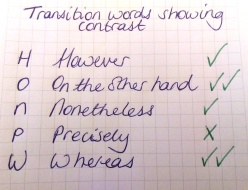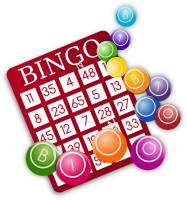What do you do in those last 5 minutes of class when you’ve finished everything that was planned? Or when energy levels hit a low during a lesson? Or in that lull while the next student gets ready to present, or whatever? We all know about the need to revise and recycle new vocabulary in language lessons, and in this post I want to share a few vocabulary revision activities that teachers can slot into any downtime that might occur in a lesson!
I’ve built up my repertoire of this kind of quick review activity over the years, so many are borrowed or adapted from colleagues, and others are based on popular board games. I want to give you a collection, all in one place, of collaborative and competitive activities that check students have remembered and actually understood new words (i.e. there are no rote learning activities here!) You can print out this post and take it to lessons with you – that’s the only paper you’ll need: all of these activities have one main thing in common – you don’t need to photocopy anything to do them!
1. Scategories

Choose a category of vocabulary you want students to revise, for example ‘character traits’, ‘school subjects’, ‘transition words showing contrast’. Choose 5-10 letters of the alphabet and write them, with the category, on the board. Students (in teams, if you wish) now have 1 minute to come up with one vocabulary item fitting the category which starts with each of the letters you have chosen. Compare answers. To make it into a competition, give points: Students or teams get 2 points if they’ve written a correct vocab item that no one else / no other team has written, and one point for correct vocab items that someone else wrote down, too.
2. ‘Taboo’ on the board
Like the game ‘Taboo’, but without any little slips of paper that need preparing! It works best with nouns. Get your learners to sit with their backs to the board. Option 1: Choose one student to look at the board and see the word you’ve written there. They have to explain it to the other students, who try to guess which word is being explained. The first student who guesses correctly can be the next one to explain a word. Option 2: Group competition! Students sit in teams/groups with their backs to the board. One team member turns around and looks at the word you’ve written on the board, and explains it to their team members, who try to guess which word it is. Give them a time limit (e.g. 30 secs per word). For each word correctly guessed within the time limit, the team gets one point (keep track on the board) and then the next team has a turn. To make either option more difficult, write the main word on the board (maybe put a circle around it) and add two or three ‘taboo’ words which are not allowed to be used in the explanation. For example, if the main word is “bauble”, the taboo words might be “Christmas,” “tree” and “decoration.”
3. Beep
This guessing game works best with verbs or verb phrases, but nouns can be good, too. One student is told a ‘secret word’ which is to be ‘beeped out’ (like swearwords on TV). The other students ask them yes/no questions to try to guess the secret word – each student is only allowed one question at a time. For example, “Who BEEPS?” “Do you BEEP on your own?” “What do people BEEP most often?” As these examples show, the activity can be used with fairly low-level language, but I’ve also used it in EAP with verbs such as research, evaluate, and analyse. After their question has been answered, the student can make a guess at the secret word, if they wish – if they get it right, they can be the next one who is given a secret word. To make it more difficult, allow each student only 2 guesses at the secret word during each round.
4. Sentence editing bingo
I like using this one to revise adverbs or adverbial phrases, but nouns work, too. Students a re asked to write down a number of vocab items that you’ve recently covered in a particular category (e.g. adverbs of manner, adverbial phrases for time/place, things you find in a classroom). Choose the number according to how much time you have and how many sentences you think you’ll get through. Usually 5 or so is enough. Students can also work in pairs. Write a simple sentence on the board, such as “I like reading.” Students tick off one of their words if they think it can fit correctly into the sentence. For example, a student might tick off ‘in the evening’ or ‘really,’ or maybe ‘books’ if you’ve gone with nouns. Repeat this with several sentences. Once a student has ticked off, i.e. thinks they’ve been able to use appropriately, all of their words/phrases, they shout ‘Bingo!’ Check their answers together as a class – if there’s time, check other students’ suggestions, too.
re asked to write down a number of vocab items that you’ve recently covered in a particular category (e.g. adverbs of manner, adverbial phrases for time/place, things you find in a classroom). Choose the number according to how much time you have and how many sentences you think you’ll get through. Usually 5 or so is enough. Students can also work in pairs. Write a simple sentence on the board, such as “I like reading.” Students tick off one of their words if they think it can fit correctly into the sentence. For example, a student might tick off ‘in the evening’ or ‘really,’ or maybe ‘books’ if you’ve gone with nouns. Repeat this with several sentences. Once a student has ticked off, i.e. thinks they’ve been able to use appropriately, all of their words/phrases, they shout ‘Bingo!’ Check their answers together as a class – if there’s time, check other students’ suggestions, too.
5. Changing corners
This activity will get students up and moving around the room! Make sure they move their chairs and bags out of the way! Nominate corners or sides of the room that are the ‘spelling zone’, ‘definition zone’, and ‘example zone’. Call out one vocabulary item you want to revise. Students have to move and stand by the corner or wall that shows the challenge they feel comfortable doing with that word: spelling it, defining it, or using it in an example sentence. Pick one student from each zone to give their answer out loud. To make it a competition, either give points for correct answers (1 for spelling, 2 for defining, 3 for an example use), or get anyone who gives an incorrect answer to sit down, then keep going with different vocab items until only three students are left! (For this, you might need to increase the difficulty of the words as you go along!)

Hi Clare
Thank you so much for this post! I loved all the activities, and am taking 2 things on board: from(1), the idea of awarding points (the ‘2’ for someone who wrote the word the other have not makes so much sense!) and from (5), the corners to challenge themselves. I might also add a ‘phonemic script’ zone, and will also think what other categories could be used. Perhaps, name the context in which this word was used in our lessons?
Thank you for this much-needed inspiration!
Zhenya
LikeLiked by 2 people
Thanks Zhenya! You know, I did think about making a “phonemic script” zone in activity 5, but I wasn’t sure how widely spread that is in ELT … but yes, go ahead and adapt away! 🙂
LikeLiked by 2 people
Nice familiar games. But do such games work with adults? I mean this works very well with younger students. So what would you recommend for adults or people who are at the age of 16-18?
LikeLiked by 1 person
Hi Valentin! I would do these activities with university students, but I suppose especially the competition aspects might depend on the whole class dynamic and how the teacher introduces the task. I don’t see any major problems with using them with teenagers or adults, though, especially as some of them are based on popular board games that people of all ages play!
LikeLiked by 1 person
Some lovely ideas. I shall share this with my teachers.
LikeLike
Reblogged this on .
LikeLiked by 1 person